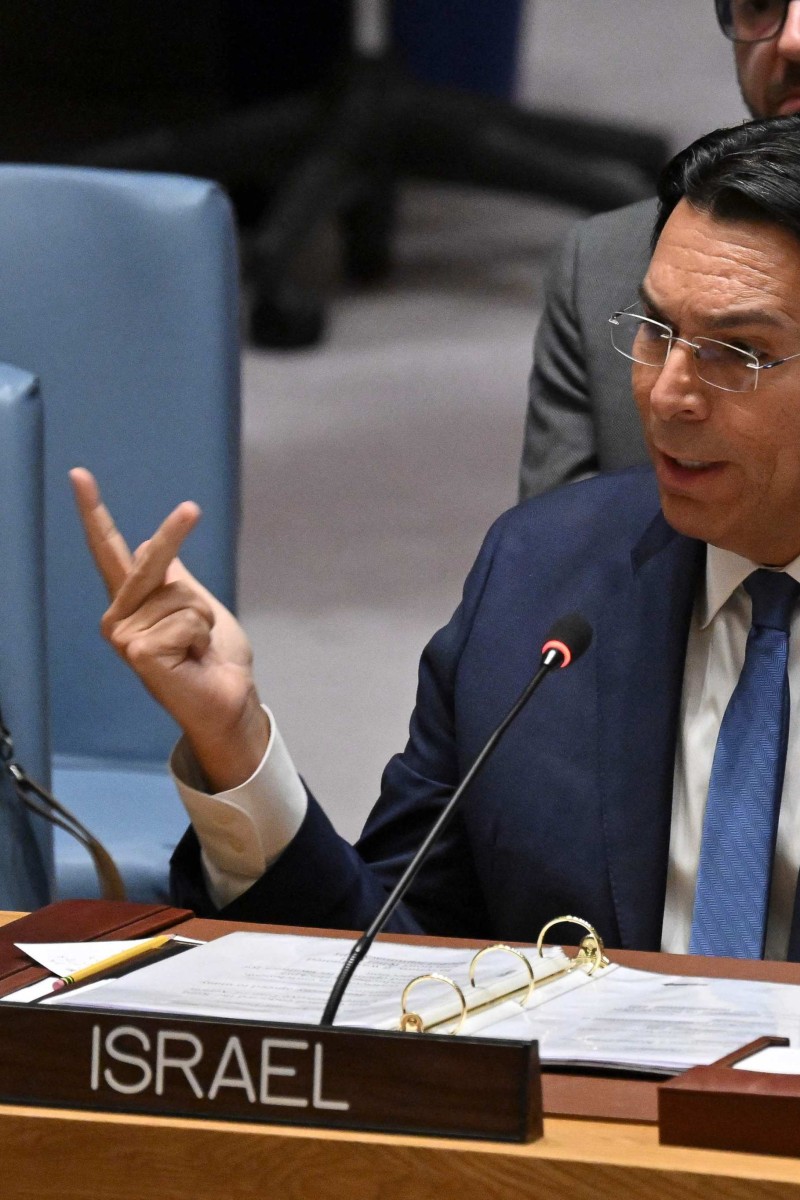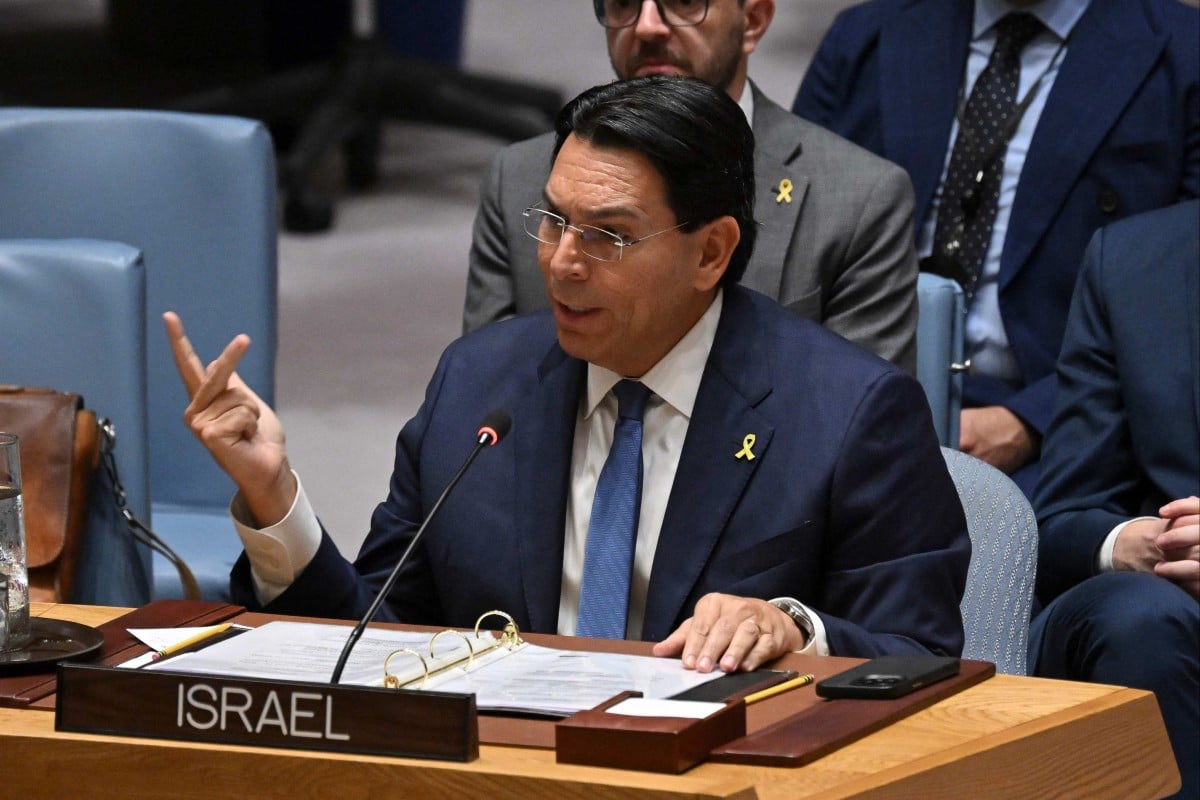
As it attacks Iran, Israel maintains ambiguity about having potentially enough plutonium to make 277 nuclear weapons, according to a global security organisation
 Israels ambassador speaks during a UN Security Council meeting at United Nations headquarters on June 24, 2025 in New York, US. Photo: AFP
Israels ambassador speaks during a UN Security Council meeting at United Nations headquarters on June 24, 2025 in New York, US. Photo: AFPIsrael has said it is determined to destroy Iran’s nuclear programme because its rival’s secretive efforts to build an atomic weapon are a “threat to its existence”.
But what’s not-so-secret is that Israel is believed to be the only nation in West Asia or the Middle East with nuclear weapons for decades. Its leaders have refused to confirm or deny their existence.
Israel’s ambiguity has enabled it to maintain its deterrence against Iran and other enemies, experts have said, without triggering a regional nuclear arms race or inviting pre-emptive attacks.
Israel is one of just five countries that are not party to a global nuclear non-proliferation treaty. That relieves it of international pressure to disarm or even to allow inspectors to scrutinise its facilities.
Critics in Iran and elsewhere have accused Western countries of hypocrisy for keeping strict tabs on Iran’s nuclear programme – which its leaders insist is only for peaceful purposes – while effectively giving Israel’s suspected arsenal a free pass.
On Sunday, the United States military struck three nuclear sites in Iran, inserting itself into Israel’s effort to destroy Iran’s programme.
Here is a closer look at Israel’s nuclear programme.
Israel and Iran trade fire for fifth day, Trump leaves G7 summit
A history of nuclear ambiguity
Israel opened its Negev Nuclear Research Centre in the remote desert city of Dimona in 1958 under the country’s first leader, Prime Minister David Ben Gurion. He believed the tiny fledgling country was surrounded by hostile neighbours and needed nuclear deterrence as an extra measure of security.
After it opened, Israel kept the work at Dimona hidden for a decade, telling United States officials it was a textile factory, according to a 2022 article in the Bulletin of the Atomic Scientists, an academic journal.
Relying on plutonium produced at Dimona, Israel has been able to fire nuclear warheads since the early 1970s, according to that article, co-authored by Hans M. Kristensen, director of the Nuclear Information Project with the Federation of American Scientists, and Matt Korda, a researcher at the same organisation.
Israel’s policy of ambiguity suffered a major setback in 1986, when Dimona’s activities were exposed by Mordechai Vanunu, a former technician at the site. He provided photographs and descriptions of the reactor to Britain’s Sunday Times newspaper.
Vanunu served 18 years in prison for treason and is not allowed to meet with foreigners or leave the country.
Israel possesses dozens of nuclear warheads, experts say
Experts estimate Israel has between 80 and 200 nuclear warheads, although they say the lower end of that range is more likely.
Israel also has stockpiled as much as 1,110kg (2,425 pounds) of plutonium, potentially enough to make 277 nuclear weapons, according to the Nuclear Threat Initiative, a global security organisation.
It has six submarines believed to be capable of launching nuclear cruise missiles, and ballistic missiles believed to be capable of launching a nuclear warhead up to 6,500km (4,000 miles), the organisation says.
Germany has supplied all of the submarines to Israel, which are docked in the northern city of Haifa, according to the article by Kristensen and Korda.
In the Middle East – where conflicts abound, governments are often unstable, and regional alliances frequently shift – nuclear proliferation is particularly dangerous, said Or Rabinowitz, a scholar at Jerusalem’s Hebrew University and a visiting associate professor at Stanford University.
“When nuclear-armed states are at war, the world always takes notice because we don’t like it when nuclear arsenals … are available for decision-makers,” she said.
Rabinowitz says Israel’s military leaders could consider deploying a nuclear weapon if they found themselves facing an extreme threat, such as a weapon of mass destruction being used against them.
Three countries other than Israel have refused to sign the Treaty on the Non-Proliferation of Nuclear Weapons: India, Pakistan and South Sudan. North Korea has withdrawn. Iran has signed the treaty, but it was censured earlier this month, shortly before Israel launched its operation, by the UN’s nuclear watchdog – a day before Israel attacked – for violating its obligations.
Israel’s policy of ambiguity has helped it evade greater scrutiny, said Susie Snyder at the International Campaign to Abolish Nuclear Weapons, a group that works to promote adherence to the UN treaty.
Its policy has also shone a light on the failure of Western countries to rein in nuclear proliferation in the Middle East, she said.
They “prefer not to be reminded of their own complicity”, she said.